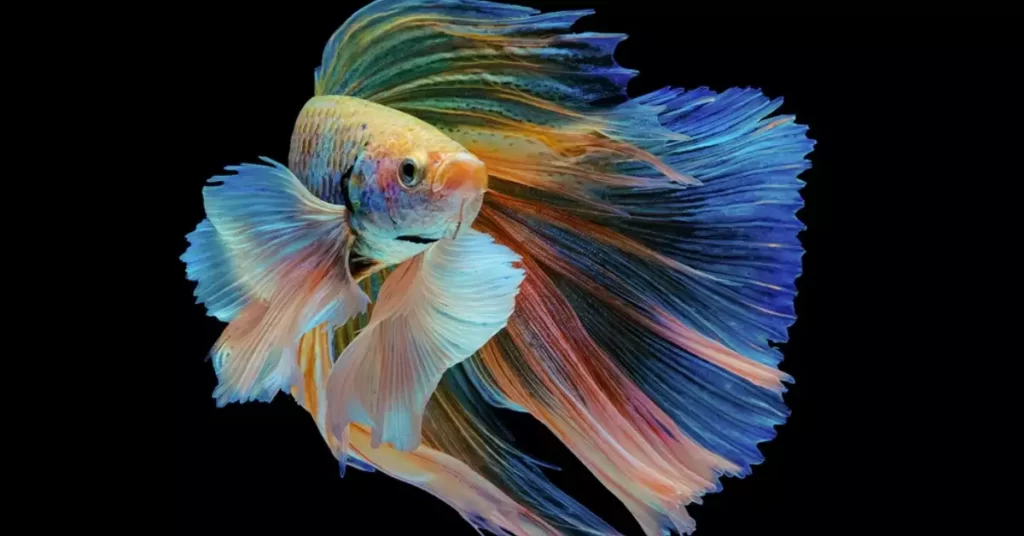As a betta fish owner, you might be wondering whether TetraMin Tropical Flakes are suitable food for your aquatic pet.
In this article, we will dive deep into the topic, discussing the dietary needs of betta fish, the components of TetraMin Tropical Flakes, and whether or not they are a good fit for bettas. So, let’s start by understanding the dietary requirements of betta fish.
Understanding Betta Fish Dietary Needs
Carnivorous Nature of Betta Fish
Betta fish, also known as Siamese fighting fish, are carnivorous by nature. In the wild, they primarily feed on small insects, larvae, and even smaller fish.
Their diet is protein-rich, which helps them stay healthy, maintain their vibrant colors, and support their immune system.
Importance of a High-Protein Diet
A high-protein diet is essential for betta fish to thrive in captivity. They require a diet consisting of at least 40% protein to maintain their health and vibrancy.
Feeding betta fish food that is low in protein can lead to various health issues, including lethargy, fading colors, and a weakened immune system.
TetraMin Tropical Flakes: Ingredients and Nutritional Profile
Main Ingredients
TetraMin Tropical Flakes are primarily designed for tropical fish, which have different dietary needs than betta fish.
The main ingredients in TetraMin Tropical Flakes include fish meal, dried yeast, shrimp meal, and algae meal. These ingredients provide a blend of proteins, carbohydrates, and fats.
Protein Content
TetraMin Tropical Flakes have a protein content of around 46%, which is higher than the minimum protein requirement for betta fish.
However, the protein sources in TetraMin may not be as suitable for bettas as they are for tropical fish.

Can Betta Fish Eat TetraMin Tropical Flakes?
Feeding TetraMin to Betta Fish
While betta fish can technically eat TetraMin Tropical Flakes, they may not be the ideal food choice for them.
The main concern is the difference in protein sources between betta fish and tropical fish diets. Betta fish thrive on a diet of animal-based proteins, while TetraMin Tropical Flakes contain a mix of animal and plant-based proteins.
Potential Health Issues
Feeding betta fish a diet primarily consisting of TetraMin Tropical Flakes could lead to potential health issues.
Some of these issues may include digestive problems, a compromised immune system, and a lack of proper nutrients for optimal health and coloration.
Alternatives to TetraMin Tropical Flakes for Betta Fish
Betta-Specific Pellets
There are many betta-specific pellets available on the market that provide a more suitable and balanced diet for betta fish.
These pellets contain high-quality, animal-based proteins that meet the dietary needs of betta fish.
Frozen or Freeze-Dried Foods
Betta fish can also benefit from a diet that includes frozen or freeze-dried foods, such as bloodworms, brine shrimp, and daphnia.
These foods provide essential nutrients and a variety of protein sources, which contribute to the overall health and well-being of betta fish.
Frequently Asked Questions
Can betta fish eat other types of tropical fish food?
While betta fish can consume other types of tropical fish food, it is essential to ensure that the food provides the appropriate nutrients and protein sources for bettas.
Always opt for high-quality, animal-based proteins, and consult with a veterinarian or aquarium specialist if you have concerns about your betta’s diet.
How often should I feed my betta fish?
Betta fish should be fed 1-2 times per day, with a small amount of food each time. Overfeeding betta fish can lead to obesity, digestive issues, and other health problems.
Can betta fish live on a diet of pellets alone?
While betta-specific pellets can provide a balanced and suitable diet for betta fish, it is always recommended to include variety in their diet.
Including frozen or freeze-dried foods in their diet can provide additional nutrients and help prevent boredom.
Conclusion
In conclusion, while TetraMin Tropical Flakes may technically be consumed by betta fish, they are not the ideal food choice for them.
Betta fish require a high-protein diet consisting of animal-based proteins to thrive in captivity.
There are many alternatives available, including betta-specific pellets and frozen or freeze-dried foods, that provide a more balanced and suitable diet for betta fish.
By providing your betta with a varied diet that meets their nutritional needs, you can help ensure that they remain healthy, vibrant, and happy for years to come.